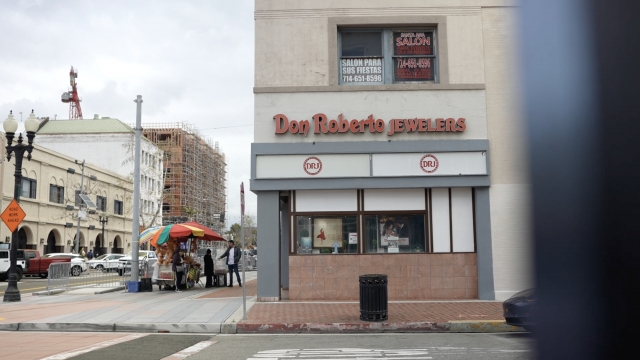In 2021, Latino-owned businesses grew 44%, compared to 4% for non-Latino-owned businesses, according to the Stanford Latino Entrepreneurship Initiative's 2021 State of Latino Entrepreneurship Report. White businesses grew 8% over that same time frame.
Despite the growth, however, some Latino businesses owners say they are still fighting for fair representation among their city's promotional materials.
"The main thing is we, the Latino community, feel discriminated," said Gigi Sanchez, owner of a health supplement store in downtown Santa Ana, California. "We feel like we've been pushed back. And this is stuff I've even asked my customers: Why aren't you guys coming back anymore?"
Sanchez's business has been in her family for generations, but she says she is facing harsher economic conditions than any of the previous owners in her family. She says in the last few years, the city has not given her, or other Latino-owned businesses in the area, fair representation in promotional materials, despite the city's 77% Latino demographic.
SEE MORE: KTNV: More Latinos Are Becoming Homeowners, But Roadblocks Remain
"I feel sad for my customers that they don’t feel good enough—that their money’s not good enough anymore. That's not right," Sanchez said.
According to the State of Latino Entrepreneurship Report, the number of employees at Latino-owned businesses has grown 55% since 2007, and according to a report by Bain & Company, if Latino owned businesses had the same access and connections to capital as White-owned businesses, they could add $1.4 trillion to the U.S. economy, "which would add almost eight percent to the $18 trillion U.S. economy."
A neighboring store owner in Downtown Santa Ana, Juliet Castro, says her business has also been hurt by what she says is an inappropriate lack of representation.
"[Downtown] is recognized as the Little Mexico," she said. "It's our community. It's where we find our dresses, it's where we find our language. That's how we feel secure."
SEE MORE: The correlation between integration, successful Black-owned businesses
Starting last year, Castro and Sanchez teamed up with 80 other minority business owners in the city to protest to the Santa Ana City Council. After hearing feedback, the city council voted to dissolve its downtown business district in January, as it was requiring business owners to pay $1,000 a year for its promotional materials.
The move was recompense to the store owners who said they did not feel like their money was being put to good use.
"It's always important for residents to feel like their government is listening to them — that their elected officials are listening to them," said Paul Eakins, spokesperson for the city of Santa Ana.
Currently, there is widespread construction downtown for a new tram car system meant to better connect neighboring cities in Orange County. After the store owners went to the city saying how the construction was hurting their bottom line, the city council approved $1.5 million in grants to these businesses, with an additional $1.5 million approval a few months later, but store owners say they still deserve more respect moving forward.
"I have a lot of emotions," said Sanchez.
Trending stories at Scrippsnews.com




